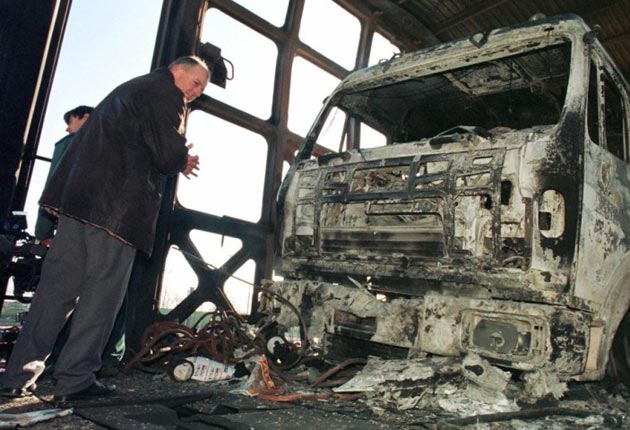Eurotunnel fire sparks ultimate insurance fight

Your support helps us to tell the story
From reproductive rights to climate change to Big Tech, The Independent is on the ground when the story is developing. Whether it's investigating the financials of Elon Musk's pro-Trump PAC or producing our latest documentary, 'The A Word', which shines a light on the American women fighting for reproductive rights, we know how important it is to parse out the facts from the messaging.
At such a critical moment in US history, we need reporters on the ground. Your donation allows us to keep sending journalists to speak to both sides of the story.
The Independent is trusted by Americans across the entire political spectrum. And unlike many other quality news outlets, we choose not to lock Americans out of our reporting and analysis with paywalls. We believe quality journalism should be available to everyone, paid for by those who can afford it.
Your support makes all the difference.When a fire closed the Channel Tunnel in September 2008, the struggling operator Eurotunnel no doubt consoled itself with one thought: its insurers would pay up. More than two years and a half years later, however, Eurotunnel remains embroiled in a legal battle with the train operators that use its infrastructure between Britain and the Continent.
Consequently, like any punter kept waiting for their car or contents insurer to pay out, Eurotunnel – the operator of the 30-mile road and rail link – is feeling the financial pain of a delay in receiving one of the biggest ever corporate insurance payouts. Yesterday, the rail operator swung to a €57m loss for 2010, compared with a profit of €7m the previous year, and it blamed its woes firmly on the "freezing of €59m of indemnities", although it was paid €11m of this in February.
However, what makes the dispute more colourful is that this freezing is the result of the rail operators who use the tunnel, Eurostar and SNCF, lodging a claim in 2009 against the same insurance claim lodged by Eurotunnel itself, instead of seeking indemnities through their own insurers. In simple terms, Eurostar and SNCF sought compensation from an insurance policy that they were not even paying for.
While Eurostar declined to comment on the matter, an extract from Eurotunnel's 2009 accounts suggests that it and SNCF felt that because the fire resulted in disruption to their businesses from an incident outside the remit of their own insurance policies, they should lodge a claim for compensation with Eurotunnel's insurers.
In the report, the tunnel operator said: "[Eurotunnel's] insurers have received from the railways a claim for compensation relating to the fire on 11 September 2008 in respect of their own operating losses, as the railways consider that [Eurotunnel's] insurers should also compensate them for their operating losses following the fire."
Certainly, it is fair to say that Eurotunnel probably did not expect to be facing a legal battle so long after the fire in September 2008, which led to it closing one-sixth of the tunnel for about five months. Eurotunnel has put the total cost of the damage caused by the fire at about €290m, including the rebuilding of the affected tunnel, compensation for the loss of an entire freight train, and its operating losses.
After Eurostar lodged its claim in May 2009 at a commercial court in Paris, the French court froze the part of the process relating to the outstanding indemnity of €48m. Jacques Gounon, the chairman of Eurotunnel, said: "The delay in payment of the insurance indemnities has impacted heavily on our net result but the group is working to rectify this situation."
Eurotunnel said the €57m loss in 2010 was due to the absence of insurance payouts, as well as €4.5m linked to the reconditioning of a shuttle.
Aside from the insurance dispute, Eurotunnel said its revenues rose by 26 per cent to €737m last year. Stripping out the financial impact of its insurance battles, it expects to break even this year. The number of Eurostar passengers grew by 3 per cent to 9.5m in 2010.
Eurotunnel's path to reinvention has been long and tortuous, with the trouble starting almost as soon as the company was formed in 1986.
Delays and disputes with contractors pushed the tunnel's opening date back from May 1993 to November 1994, and the cost ballooned from £4.7bn to £9.5bn, of which an eye-watering £8bn was debt.
Join our commenting forum
Join thought-provoking conversations, follow other Independent readers and see their replies
Comments